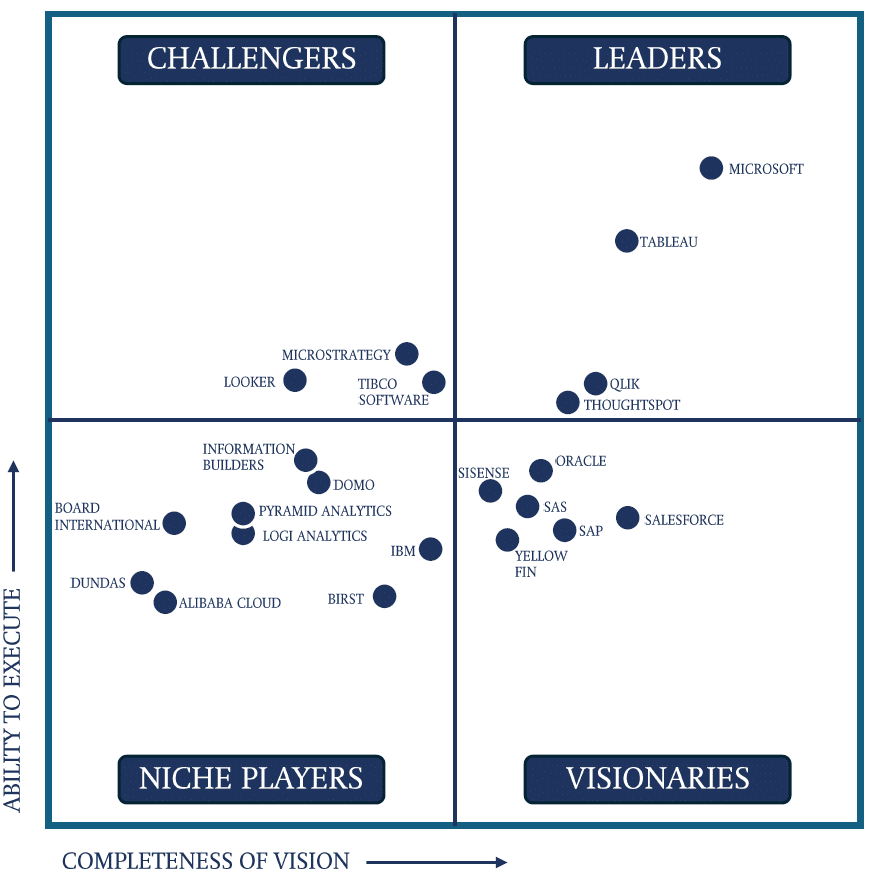
LEVERAGING BUSINESS INTELLIGENCE
FIVE RECOMMENDATIONS TO IMPROVE COMPETITIVE ADVANTAGE
Business Intelligence (BI) is a game-changer for firms seeking a competitive edge. Gartner (2020) predicts a shift towards data stories becoming the dominant format for data analysis, with a surprising 75% of these stories being created automatically by AI-powered tools by 2025. By connecting various data sources from different systems, providing real-time updates, deep diving into critical insights, BI empowers you to make informed, strategic decisions based on a holistic understanding of your business. We have listed five impactful recommendations to leverage the power of BI and unlock significant performance improvements for your firm.
Improved decision-making
BI transforms large amounts of data into meaningful insights and actionable recommendations in real time, eliminating the need to wait for monthly reports or manually compiled data. Monitoring and evaluating sales in real time enables businesses to, for example, directly identify which strategies are yielding the best results. This facilitates faster and simpler decisions regarding inventory adjustments or optimization of ongoing campaigns for maximized return on investment.
Streamlined ecosystem and collaboration
A BI platform can synchronize and develop an ecosystem of all an organization’s systems, simplifying data sharing in a visually clear and compelling way to other departments or management teams. By using reports with clear visualizations of outcomes or performance, organizations can effectively communicate complex data internally or to various stakeholders, fostering better internal communication and collaboration.

Elimination of human errors
Digitization through automation of various repetitive and time-consuming manual processes eliminates the risk of human errors, while freeing up time and resources for other valuable tasks. This in turn increases productivity and efficiency within the company. By avoiding human errors, businesses can also increase the quality and accuracy of their processes, which benefits both the company and its customers.
Customer experience and satisfaction
BI tools have revolutionized how businesses interact with their customers. By analyzing purchasing behavior, browsing habits, and past purchases, businesses can craft personalized offers and campaigns that resonate with individual customers. This targeted approach not only boosts sales through repeat purchases but also fosters deeper customer loyalty, a key driver of long-term success.
Retaining customers proactively
Real-time data and interactive dashboards empower financial professionals to become proactive navigators, not just reactive observers. This goes beyond simply predicting trends. Advanced analysis and modeling unlock the ability to anticipate market shifts, enabling informed decisions ahead of time. Take suppliers, for example. By leveraging BI to analyze customer behavior, they can identify customers at risk of churning. This foresight allows them to take proactive steps to retain these customers, minimizing churn and maximizing loyalty.
“My client was drowning in data silos. A company-wide BI implementation is throwing them a lifeline and completely transforming how they work. It bridges the gap between business and finance, fostering a shared understanding of each department’s contributions. Strategic planning and precise decision-making have seen a significant boost thanks to the ease and speed of accessing the right information. The organization is now working faster, smarter, and more collaboratively.”
– Carl Holmgren, Head of BI, Insource
Despite all the advantages, there are still challenges that businesses must address when implementing BI tools shown in research. Ensuring data quality and integrity is one of the primary concerns. Additionally, using BI often requires a change in corporate culture to fully leverage its potential. Therefore, training and developing employees’ data-driven skills and motivation for change is a crucial investment. The future of BI and data-driven decision-making looks bright. With the emergence of advanced analytics, machine learning, and artificial intelligence, BI tools will be able to provide even deeper insights and predictions.
Quadrant for Analytics and BI Platforms

Source: Gartner (2020)
As BI tools become increasingly ubiquitous in businesses, the next frontier beckons with the integration of advanced analytics, machine learning, and artificial intelligence. These emerging technologies have the potential to revolutionize decision-making by offering unparalleled insights and predictive capabilities. The convergence of BI and AI heralds a new era of data-driven innovation, poised to reshape industries and redefine competitive advantage – this will be delved deeper into in a future article.
Embrace data-driven success. Contact us today to learn how our expertise can help you implement BI tools and unlock their competitive advantages!
Felicia Ahlberg, Senior Consultant, Insource
Sources
Captain, S. (2023). The Technology Skills Every Employee Should Have Today. The Wall Street Journal. March 18. https://www.wsj.com/articles/technology-skills-employees-should-have-fdc6c0ba (240517)
Gartner (2020). Magic Quadrant for Analytics and Business Intelligence Platforms. https://bpmtraining.net/wp-content/uploads/2020/10/gartner-magic-quadrant-for-analytics-and-business-intelligence-platforms-feb-2020.pdf (240517)
Microsoft Power BI (2024). Power BI – Uncover powerful insights and turn them into impact. https://www.microsoft.com/en-us/power-platform/products/power-bi#tabs-pill-bar-ocb9d418_tab1 (240517)











